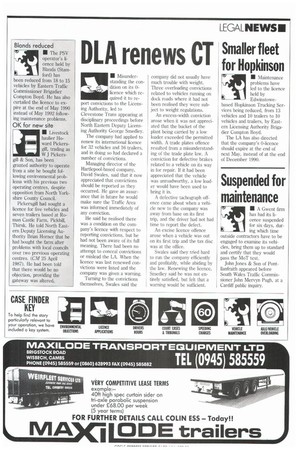DLA renews CT
Page 23

If you've noticed an error in this article please click here to report it so we can fix it.
• Misunderstanding the condition on its 0licence which required it to report convictions to the Licensing Authority, led to Clevestone Trans appearing at disciplinary proceedings before North Eastern Deputy Licensing Authority George Smedley.
The company had applied to renew its international licence for 32 vehicles and 16 trailers, and in doing so had declared a number of convictions.
Managing director of the Hartlepool-based company, David Swales, said that it now appreciated that convictions should be reported as they occurred. He gave an assurance that in future he would make sure the Traffic Area was informed immediately of any conviction.
He said he realised there was a condition on the company's licence with respect to reporting convictions, but he had not been aware of its full meaning. There had been no attempt to conceal convictions or mislead the LA. When the licence was last renewed convictions were listed and the company was given a warning.
Turning to the convictions themselves, Swales said the company did not usually have much trouble with weight. Three overloading convictions related to vehicles running on dock roads where it had not been realised they were subject to weight regulations.
An excess-width conviction arose when it was not appreciated that the bucket of the plant being carried by a low loader exceeded the permitted width. A trade plates offence resulted from a misunderstanding of the trade plate law. A conviction for defective brakes related to a vehicle on its way in for repair. If it had been appreciated that the vehicle was unroadworthy, a low loader would have been used to bring it in.
A defective tachograph offence came about when a vehicle new to the company was away from base on its fu-st trip, and the driver had not had time to report the defect.
An excise licence offence arose when a vehicle was out on its first trip and the tax disc was at the office.
Swales said they tried hard to run the company efficiently and profitably, while abiding by the law. Renewing the licence, Smedley said he was not entirely satisfied, but felt that a warning would be sufficient.


























































































































